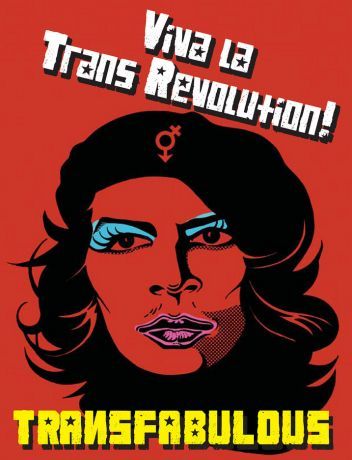Features
You are here
The fight for trans liberation

June 27, 2013
The fight for trans liberation is in an exciting period right now; we have passed beyond the initial stages of the movement into witnessing its first gains.
Some recent victories have taken place, such as the passage of amendments to human rights legislation in Ontario and Nova Scotia, which join the Northwest Territories to include gender identity as protected grounds from discrimination. A similar bill to amend the Canadian Human Rights Act and the hate crimes provision of the Criminal Code has passed in Parliament and is currently awaiting Senate approval, although it’s currently being hung up by Conservatives not wanting to call a vote on it. After a lengthy campaign, funding was restored in Ontario in 2008 for sex reassignment surgery, although access to trans health care remains a significant equality issue. And a transgender first-grader in Colorado was awarded legal sanction to use the restroom facilities at school which correspond with her gender identity.
At the same time as these victories there are still many struggles that are ongoing, and continuing discrimination in many areas. As socialists, we see the fight for liberation from oppression being informed by analysis of the roots of that oppression and the system that maintains it.
Roots of trans oppression
As Marxists, we can see trans oppression arising from the same roots as women’s oppression, and in a way similar to gay and lesbian oppression. The origin of women's oppression in the rise of class society was first outlined by the revolutionary Frederick Engels. The core of Engels’ argument was that the development of private property led to the creation of a society divided into classes—those who owned and controlled the wealth and those who didn't—and the creation of a state machine to protect this property, and a family to ensure that this property was passed on to “legitimate” heirs. This represented the development of women's oppression, the monogamous family and, with it, the "world historic defeat of the female sex".
Engels, following the early anthropological studies of Lewis Henry Morgan, maintained that in early societies there was no private property, no division into classes, and no domination of men over women. Despite some critique, the core of Engels’ account of early hunter-gatherer societies has stood up to subsequent analysis.
The evolution of class societies took place over thousands of years, as agriculture developed and spread. This led to changes in social organization and in the reproductive needs of societies.
In hunter-gatherer societies there was a need to space the birth of children because of the practical considerations of carrying children, gathering food on a daily basis and moving frequently. As agricultural societies gradually developed there was a need for more hands for work, with each child representing an extra pair of hands. Villages and cities developed, and with these came higher death rates, more susceptibility to disease, increased warfare and other features of developing class societies. All of these factors contributed to the need for an increased birth rate, which gradually caused a shift in the dynamics of society—including the structure of the family.
Over time, the ability to accumulate wealth led to the development of social classes and the result of these shifts was the domination of women by men and greater social control over all members of society.
Since the emergence of early class societies, the nature of class society has changed over time but the oppression of women has continued. The specific character of the family has changed over time and varied between societies and the oppression of women has taken on different forms. The specific form of women's oppression also varies within societies, between members of the exploiting class and the exploited class.
In the second half of the nineteenth century, the form of the working class family changed. The private nuclear family emerged, in which a male head of household works and his wife looks after the family and the home. This form of the family arose because workers at the time saw the alternative as substantially worse. Some of the pressures that had arisen would have continued: women working up to 18 hours a day, breast feeding or suffering miscarriages at their machines, children working from as young as four years of age and sustaining terrible injuries. The needs of the capitalist class had also changed—namely, a more stable workforce in which the next generation of workers would be raised, cared for, socialized, and educated at minimal cost to the ruling class.
The essence of this form of the private, heterosexual nuclear family has remained today, although the role of women has continued to shift.
Many contradictory forces are at play on the family as a social construct. Government and the state must shore up the family—a simple example being tax and other incentives for married people. At the same time, pressures on working people act to break it down. In the face of this, a powerful set of ideologies is required to maintain the family, such as specific and narrow definitions of roles for men and women, and limitations on sexuality. Anyone who strays from these norms, including GLBQ people and trans people, must be systemically oppressed in order to maintain the prevailing definition of the family.
Maintaining gender norms
People whose appearance or behaviour do not conform to gender norms for their society have existed throughout history and across different cultures. For example, there is evidence that gender variant people have been able to live comfortably within indigenous societies in North America since prior to colonization by Europeans. This strongly suggests that the form of social organization under which they lived was less rigid about gender distinctions, and that rigid ideas about gender roles had developed in Europe by that time.
Gender variance was not classified formally as an aberration until after the development of the nuclear family, around the late nineteenth to early twentieth centuries. The earliest writings of doctors and social scientists in this context discussed behavior that fell outside notions of normal masculinity and femininity as well as same-sex sexual behaviour as aberrant and pathological without distinguishing these as distinct entities.
The distinct category of “transsexual” arose in the 1950s, as the first trans people began to undergo hormonal and surgical procedures with the aid of medical doctors to ease their pain and discomfort. The classification of “gender dysphoria” as a psychiatric illness began at this time, and is still retained today as a prerequisite for access to hormones and surgery in many places. The criteria for such diagnosis tend to reinforce the same narrow gender stereotypes that exist in broader society.
Biological determinism
The medicalization of trans people continues into the present, in the form of biological determinist theories about the "causes" of transsexuality. For example, the theory has been put forward that the brains of transsexuals develop in the womb in the opposite way to the individual's physical sex. Small studies using questionable methods are presented as support for these theories.
It makes sense from a socialist perspective that biology could play a role in formation of gender identity. However, biological determinist approaches, which crudely reduce all social causes to biology, must be exposed as a reactionary misuse of science. Similar explanations abound in our society, seeking to explain away everything from disease to gender differences to social problems. These serve to deny individual and collective agency to deal with societal problems through our own actions. As socialists, we view humans and their behaviors as a result of a complex and dialectical relationship between biology and the surrounding physical and social environment, rather than as passive vessels of genetic inheritance. The other implication of this viewpoint is that, as a result, we are actually able to deal with social problems, including oppression, through our own self-activity.
Wider picture of oppression under capitalism
Capitalism from its beginnings has relied on exploitation and oppression to maintain the dominance of a small minority over the large majority of people. Exploitation and oppression take on various forms and degrees, and vary both over time and between different societies.
In the case of trans oppression, like GLBQ oppression, it is true that more intense oppression is occurring in other parts of the world than here but with trans people being generally more invisible elsewhere it is difficult to know what the current situation is like in distant locations. That being said, wherever there is exploitation and oppression struggles against that oppression are also bound to arise.
The fight for trans liberation
The oppression of trans people, as I have laid out, has material roots in the capitalist system and the private family. In fact, all other forms of oppression are also rooted in the capitalist system. The two key ideas to inform the struggles that follow from this, are that: the only way for complete liberation from that oppression to happen is to replace capitalism entirely; and, the fight against all forms of oppression and exploitation are part of that same fight.
At the same time, we cannot passively wait for “the revolution” to occur in some abstract future. We must actively build a fight for reforms in order to address aspects of trans oppression—a fight which is ongoing. We can celebrate that there have been victories—such as the Ontario human rights code amendment, the reinstatement of funding for surgeries, increased visibility and acceptance, etc.—as well as recognize that there is a need for further reforms. These seemingly small victories can make real differences for people in the here and now, while giving them the confidence to carry forward the struggle and also inspiring others to join the struggle or fight on other fronts.
At the same time, many broader struggles have a huge and direct impact on trans people, such as the fight for public health care, the fight against border and immigration controls, the fight against poverty, the fight for publicly funded social services, and so on. In an environment of a continuing push for austerity, as capitalism lurches from crisis to crisis, there are huge forces that act to push back even small gains and, in this context, our struggles must be strengthened and deepened. This makes it ever more important to form alliances with other liberation struggles, although forming these alliances is neither easy nor automatic. As divisions arise it is important to keep these larger goals in mind, and as socialists we seek to help intervene in bridging differences to ensure that the struggle moves forward.
Section:










